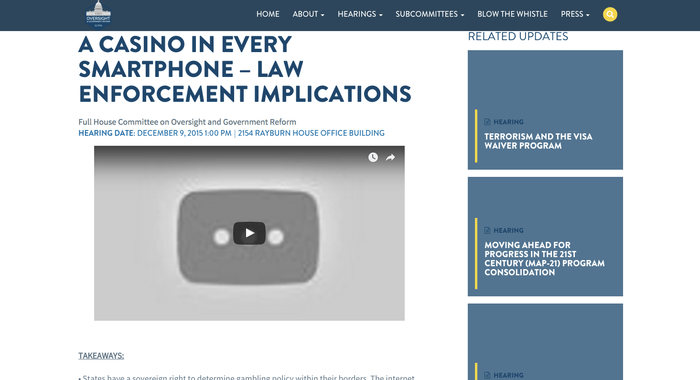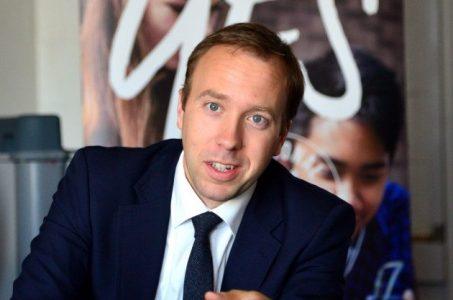RAWA House Hearing Not a Big Hit with OGR Members
Posted on: December 10, 2015, 12:01h.
Last updated on: December 10, 2015, 12:22h.

RAWA gets around more, yet remains as unloved, as that one girl you went to school with.
AKA the Restoration of America’s Wire Act, RAWA was heard in the House of Representatives on Wednesday during an Oversight and Government Reform (OGR) session titled, “A Casino in Every Smartphone: Law Enforcement Implications.”
(We’re not sure if they were making a play on the old Herbert Hoover slogan “A Chicken in Every Pot” with that session name, but interesting choice, anyway.)
Four witnesses brought their supposed expertise to Washington, DC, to testify on Rep. Jason Chaffetz’s (R-Utah) legislation that would restore the Wire Act to its pre-2011 interpretation. Four years ago, the Department of Justice ruled that the pre-Internet 1961 federal law didn’t necessarily prohibit online gambling, effectively opening states to legalize online casinos.
“We’ve had numerous attorneys general, numerous governors saying, ‘You can’t do that to our state,'” Chaffetz said in his remarks. “You just don’t unilaterally change the law with an OLC (Office of Legal Counsel) opinion.
“That poses a problem for a lot of states. States that have legalized gambling, states like myself [sic] that have no gaming, and don’t want to have any gaming,” Chaffetz declared.
Defining RAWA
“The interpretation of the Wire Act has been a question before 2011 and it remains a question now,” State Senator Mark Lipparelli (R-Nevada) testified. “You have a situation now where you have old law that hasn’t kept up with innovation.”
Lipparelli was instrumental in bringing online poker to Nevada, as he formerly served as the chairman of the Nevada Gaming Control Board. Throughout the RAWA hearing, Lipparelli was routinely called upon to defend legalization, which he did successfully, according to many observers.
Lost throughout the hearing was a central understanding of what constitutes “legal online gambling” versus “illegal online gambling”.
FBI Assistant Director for the Criminal Investigative Division Joseph Campbell provided several instances where his division has infiltrated criminal syndicates, concealing their identity online to launder money. However, when asked to provide accounts of any currently legal and regulated gambling operator’s transgressions in the same vein, Campbell said he could not furnish such examples.
Republican South Carolina Attorney General Alan Wilson swore that his state’s experience with land-based video poker has been a huge negative, and that “gambling addictions proliferated exponentially.”
“Despite South Carolina’s continued best efforts over the decades to protect our citizens from the threats posed by gambling, the Department of Justice’s revised interpretation of the Wire Act has opened the door to Internet gambling, potentially turning any mobile device in our state into a virtual casino.”
Nebraska attorney Donald Kleine then also expressed concerns about states legalizing gambling on computers and smartphones. “Online gambling easily crosses domestic and international borders and can often be accessed by anyone with Internet access,” Kleine explained.
Location, Location, Not Just Location
A shared trepidation among RAWA supporters is that current technology cannot accurately identify the whereabouts of a user trying to enter an online casino. “I think it’s naïve at best to think you can put a wall on the Internet,” Chaffetz stated.
But Chaffetz, who also serves as the OGR chair, said his concerns are much more than just location.
“Location is … a core part of it, but it also has to do with your age, it has to do with your intoxication (level), it has to do with a whole host of things,” Chaffetz detailed.
Rep. Gary Palmer (R-Alabama) also voiced fears about an adolescent getting a hold of a smartphone with a casino app installed and losing the adult owner’s entire bankroll. Lipparelli responded by declaring that such a concern isn’t specific to online gambling, and that it’s no more dangerous, or perhaps even less dangerous due to regulated iGaming controls, than a youth obtaining a credit card and going crazy shopping on the net.
Though the majority of the 43 OGR committee members skipped the RAWA discussion, those that did attend seemed apprehensive in voting to have Congress get involved with deciding the fate of online gambling for all 50 states.
OGR Website Censored
Viewers are able to watch the RAWA conversation in its entirety on the OGR website, or watch three carefully selected excerpts posted below the hours-long session.
Though the conference was well-rounded and lively, the three clips on the OGR website seems to highlight the best exchanges of primarily RAWA proponents.
Chaffetz’s whole inquiry, which was supposed to be limited to five minutes, but ran for over nine, is available for viewing in its entirety. As are comments from Wilson as he recounts a story where a young child died in a hot car outside a casino as the mother compulsively gambled inside.
Palmer’s questioning, including his opinion that gambling targets the poor, can also be watched. Palmer was one of, or perhaps the only, representative in attendance that came across as in support of RAWA, besides bill sponsor Chaffetz, of course.
Related News Articles
‘Worst Case Scenario’ Wager Slash on FOBTs Pummels UK Bookmaker Stocks
Most Popular
Las Vegas Overstated F1 Race’s Vegas Impact — Report
Mega Millions Reportedly Mulling Substantial Ticket Price Increase
NoMad Hotel to Check Out of Park MGM on Las Vegas Strip
Most Commented
-
End of the Line for Las Vegas Monorail
— April 5, 2024 — 90 Comments -
Mega Millions Reportedly Mulling Substantial Ticket Price Increase
— April 16, 2024 — 8 Comments -
Long Island Casino Opponents Love New York Licensing Delays
— March 27, 2024 — 5 Comments
















No comments yet